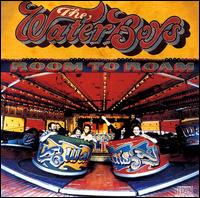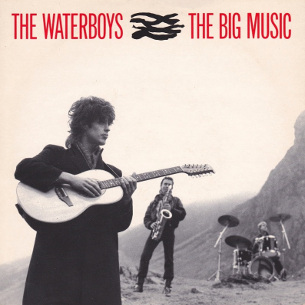Related Research Articles

The Waterboys are a folk rock band formed in Edinburgh in 1983 by Scottish musician Mike Scott. The band's membership, past and present, has been composed mainly of musicians from Scotland, Ireland, Wales and England. Mike Scott has remained as the only constant member throughout the band's career. They have explored a number of different styles, but their music is mainly a mix of folk music with rock and roll. They dissolved in 1993 when Scott departed to pursue a solo career. The group reformed in 2000, and continue to release albums and to tour worldwide. Scott emphasises a continuity between The Waterboys and his solo work, saying that "To me there's no difference between Mike Scott and the Waterboys; they both mean the same thing. They mean myself and whoever are my current travelling musical companions."

This Is the Sea is the third The Waterboys album, and the last of their "Big Music" albums. Considered by critics to be the finest album of their early rock-oriented sound, described as "epic" and "a defining moment", it was the first Waterboys album to enter the United Kingdom charts, peaking at number 37. Steve Wickham makes his Waterboys recording debut playing violin on 'The Pan Within' and subsequently joined the band, appearing on the video of "The Whole of the Moon". This Is the Sea is the last album with contributions from Karl Wallinger, who left the group to form his own band, World Party.

Fisherman's Blues is a 1988 album by The Waterboys. The album marked a change in the band's sound, with them abandoning their earlier grandiose rock sound for a mixture of traditional Irish music, traditional Scottish music, country music, and rock and roll. Critics were divided on its release with some disappointed at the change of direction and others ranking it among The Waterboys' best work. The album was the Waterboys' best selling album, reaching a number 13 placing on the U.K. charts on release, and 76 on the Billboard 200.

Spiddal is a village on the shore of Galway Bay in County Galway, Ireland. It is 18 kilometres (11 mi) west of Galway city, on the R336 road. It is on the eastern side of the county's Gaeltacht and of the Connemara region. According to the 2016 census, 35.3% of the population speak Irish on a daily basis outside the education system. It is a centre for tourism with a beach, harbour, and shore fishing. The village is part of the civil parish of Moycullen.

Michael Scott is a Scottish singer, songwriter and musician. He is the founding member, lead singer, guitarist and songwriter of rock band The Waterboys. He has also produced two solo albums, Bring 'em All In and Still Burning. Scott is a vocalist, guitarist and pianist, and has played a large range of other instruments, including the bouzouki, drums, and Hammond organ on his albums. Scott is also a published writer, having released his autobiography, Adventures of a Waterboy, in 2012.

Room to Roam is the fifth studio album by The Waterboys; it continued the folk rock sound of 1988's Fisherman's Blues, but was less of a commercial success, reaching #180 on the Billboard Top 200 after its release in September 1990. Critical response continues to be mixed. Allmusic describes it both as "not quite as [musically] successful" as Fisherman's Blues, but also as a "Celtic rock classic". The front and back covers were designed by Simon Fowler based upon photography by Stefano Giovannini and Sean Jackson.

Universal Hall is a 2003 album released by The Waterboys. It is named after the theatre and performance hall at the Findhorn Foundation, which is pictured on the album cover. The album shows much more influence from folk music than its predecessor, A Rock in the Weary Land. It is the first Waterboys album to feature Steve Wickham since Room to Roam, and therefore the first Waterboys album with all three core members of the post-reunion band.

Steve Wickham is an Irish musician. Originally from Marino, Dublin, but calling Sligo home, Wickham was a founding member of In Tua Nua and played violin on the classic U2 song "Sunday Bloody Sunday", as well as recordings by Elvis Costello, the Hothouse Flowers, Sinéad O'Connor, and World Party. He is a long-standing member of The Waterboys. Wickham plays both rock and roll and traditional Irish music, and has developed a rock music technique for violin he calls the "fuzz fiddle".

Sharon Shannon is an Irish musician, best known for her work with the button accordion and for her fiddle technique. She also plays the tin whistle and melodeon. Her 1991 debut album, Sharon Shannon, was the best-selling album of traditional Irish music ever released in Ireland. Beginning with Irish folk music, her work demonstrates a wide-ranging number of musical influences. She won the lifetime achievement award at the 2009 Meteor Awards.
Richard Naiff is a British pianist and flautist from London who has performed with the bands Soulsec, The Catacoustics, The Waterboys and The Icicle Works. Naiff is a classically trained musician, having joined the Guildhall School of Music at age ten. The Irish music website Cluas.com describes Naiff as "phenomenally talented".

"A Girl Called Johnny" is a song from Scottish-Irish folk rock band The Waterboys, which was released in 1983 as the lead single from their debut studio album The Waterboys. The song was written by Mike Scott and produced by Rupert Hine. It reached No. 80 in the UK Singles Chart and remained in the Top 100 for three weeks.

"The Big Music" is a song from Scottish-Irish folk rock band The Waterboys, which was released in 1984 as the lead single from their second studio album A Pagan Place. The song was written and produced by Mike Scott.

"Fisherman's Blues" is a song from folk rock band The Waterboys, which was released in 1988 as the lead single from their fourth studio album of the same name. It was written by Mike Scott and Steve Wickham, and produced by Scott. The song reached No. 3 on the US Billboard Modern Rock Tracks chart, No. 13 in Ireland and No. 32 in the UK. A re-issue of the single in 1991 saw the song return to the Top 20 in Ireland, reaching No. 17.

"And a Bang on the Ear" is a song from Scottish-Irish folk rock band the Waterboys, released as the second single from their fourth studio album Fisherman's Blues. It was written by Mike Scott, and produced by John Dunford and Scott. The song reached No. 1 in the Republic of Ireland and No. 51 in the United Kingdom.

"Everybody Takes a Tumble" is a song from Scottish-Irish folk rock band The Waterboys, released as the only single from their ninth studio album Book of Lightning. It was written by Mike Scott and Anthony Thistlethwaite, and produced by Scott and Phil Tennant.

"How Long Will I Love You?" is a song by folk rock band the Waterboys from their fifth studio album, Room to Roam (1990). Written by Mike Scott, it was released as the album's lead single. The song was subsequently covered by English singer Ellie Goulding and released as the second single from her album Halcyon Days (2013). Goulding's version is included on the soundtrack to the 2013 film About Time, which also features a different cover by Jon Boden, Sam Sweeney and Ben Coleman.
"World Party" is a song by the Scottish-Irish folk rock band The Waterboys, released in 1988 as a track on their fourth studio album Fisherman's Blues. It was written by Mike Scott, Trevor Hutchinson and Karl Wallinger, and produced by Scott. In the United States, the song reached No. 19 on Billboard Modern Rock Tracks chart and remained on the chart for six weeks. It also peaked at No. 48 on Billboard's Album Rock Tracks chart.

"Don't Bang the Drum" is a song from Scottish-Irish folk rock band The Waterboys, released as the opening track on their third studio album This Is the Sea. It was written by Mike Scott and Karl Wallinger, and produced by Scott. The song was released as a single in Germany and was also issued as a 12" promotional vinyl in the United States.

Good Luck, Seeker is the fourteenth studio album by The Waterboys, which was released by Cooking Vinyl on 21 August 2020.
References
- ↑ James Christopher Monger. "Room to Roam - The Waterboys | Songs, Reviews, Credits". AllMusic. Retrieved 2019-06-15.
- 1 2 Billboard. "The Waterboys A Life Of Sundays Chart History". Billboard. Retrieved 2019-06-15.
- ↑ "The Waterboys". Mikescottwaterboys.com. Retrieved 2019-06-15.
- ↑ Dessau, Bruce (14 September 1990). "Mike finds peace with his muse". The Guardian.
- ↑ George, Iestyn (29 September 1990). "Albums". Record Mirror . p. 16. ISSN 0144-5804.
- ↑ McKay, Neil (21 October 1990). "Tracks of pure joy". Sunday Life.
- ↑ "The Waterboys - Room to Roam (Collectors Edition)". Uncut. Retrieved 2019-06-15.
- ↑ Milward, John (16 November 1990). "The Waterboys adopt Ireland and its sounds for new album". The Philadelphia Inquirer.
- ↑ Armstrong, Gene (2 November 1990). "Waterboys triumph in 'Room to Roam'". The Arizona Daily Star.
- ↑ Houston, Brant (25 October 1990). "Records: ZZ Top recycles classics from the past; diverse Midler LP". The Hartford Courant.
- ↑ "Musician - Google Books". 2010-05-26. Retrieved 2019-06-15.
- ↑ Curtin, Mike (28 October 1990). "Fall harvest yields bumper crop". The Post-Star.
- ↑ McClary, Eric (25 November 1990). "On the record". Reno Gazette-Journal.